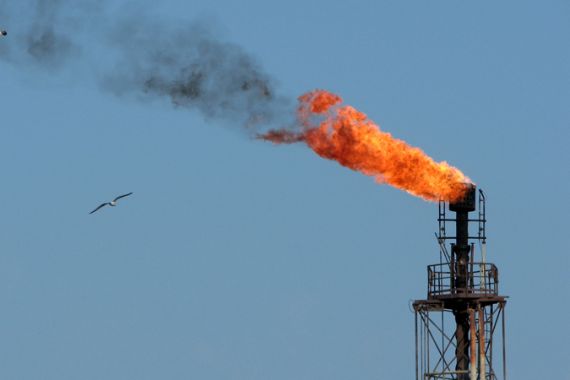Watchdog: Sudan needs new oil deal
Global Witness says the country needs fresh oil pact to ensure transparency and revenue sharing between north and south.

 |
| Chinese president Hu Jintao (R) and his Sudanese counterpart Omar al-Bashir (4th R) have overseen a profitable but murky oil-extracting partnership between their countries [EPA] |
A crucial wealth-sharing deal that splits oil profits between north and south Sudan, set to expire following the upcoming secession vote on January 9, is undermined by a significant lack of transparency, and is putting the country on a conflict path, a watchdog organisation has alleged.
In a report released on Thursday, Global Witness said that a new deal must be renegotiated between the Khartoum-based government and Southern Sudan, which is likely to become a separate state.
Keep reading
list of 4 items‘We need you’: Solomon Islands’ support for US agency’s return revealed
Why are nations racing to buy weapons?
Parallel economy: How Russia is defying the West’s boycott
The report found that the Sudanese government and the China National Petroleum Corporation (CNPC), which runs the largest oil-extraction operation in the country, have failed to explain significant discrepancies in oil production numbers that make some suspect that the government in the north is under-counting production and withholding oil revenue from its Juba-based partner in Southern Sudan.
| Sudan’s Oil |
|
|
Global Witness, a London-based group that campaigns against natural resource-related conflict and corruption, emphasised that it was not accusing the Sudanese government of “cheating,” but said it was “impossible to know for sure how much oil Sudan currently produces, and therefore impossible to know for sure whether the wealth-sharing agreement is being implemented fairly”.
In 2010, the group found that the CNPC was reporting oil production figures ranging from 9 to 26 per cent higher than the government’s, a discrepancy that would amount to around $500 million. Three years earlier, suspicions that the north was hiding oil revenue had nearly caused the downfall of the 2005 Comprehensive Peace Agreement that ended Sudan’s civil war.
With a referendum on the south’s secession approaching on Sunday, the two sides have yet to negotiate agreements to a raft of important issues, including a new oil wealth-sharing deal. That deal was part of the 2005 agreement, but it is scheduled to expire with the referendum.
Cloud over discrepancy
In the five years since peace was made, the north has shared $10 billion in oil revenue with south Sudan, and US special envoy Scott Gration has said that a new oil deal is key to preventing a return to violence.
During an August meeting organised by Global Witness, officials from President Omar al-Bashir’s administration attempted to explain the production number discrepancy by saying that the CNPC was reporting production that included water – before the oil could be separated – and that figures could differ based on the temperature and pressure at the place where the volume was measured.
The CNPC agreed with the government and added that oil companies typically consume or lose in transit between 5 and 15 per cent of their product.
But Global Witness, after interviewing an “oil industry insider” and three analysts, found that none of the explanations held up to scrutiny.
A publicly traded, international company like CNPC almost assuredly would not report production numbers that included water, the group found. Furthermore, the explanation that CNPC consumed or lost 5 to 15 per cent of its oil was both unlikely – since it would mean the Sudanese government lost out on $500 million in revenue – and would still not account for the biggest discrepancy – a 26 per cent difference found in 2005.
| No Transparency |
|
|
Though Global Witness managed to bring together Representatives from CNPC and the Sudanese government at the August meeting, neither side has been willing to provide the organisation with detailed production numbers.
Lual Deng, the petroleum minister, wrote to the group to tell them he had instructed his staff “not to waste their time working for [them]”.
‘New deal needed’
In its report, Global Witness makes a number of recommendations aimed at bringing greater transparency to Sudan’s oil production.
Bashir’s National Congress Party and the Sudan People’s Liberation Army must negotiate a new oil revenue-sharing agreement, and a “credible, independent” company must conduct a detailed audit of the country’s oil industry and release its findings in full to the public.
Detailed data about Sudan’s oil production, such as the gross and net amounts extracted from each site, the percentage of water mixed in, and the volume of oil consumed by companies, should be published and regularly verified by an independent country, the group added.
“The precariousness of the situation cannot be overstated,” the group said.
 500,000 barrels produced every day
500,000 barrels produced every day